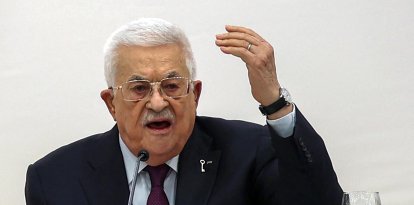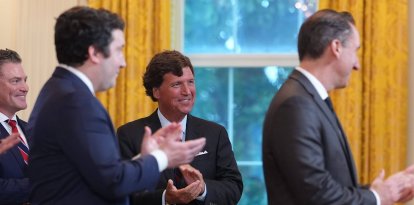Trump 2.0 means the end of ambivalence about Israel
Liberal Jewish groups are appalled by the prospect of an administration that is unabashedly pro-Israel. That says more about them than it does about him.

US and Trump flags in Jerusalem
The American people just returned the most pro-Israel president since the founding of the modern Jewish state to the White House. And he has chosen a foreign policy team that indicates that his second term will be at least as unabashedly pro-Israel and opposed to the forces seeking the Jewish state’s destruction as his first was. What’s the response from some liberal American Jews and the groups that claim to represent them? No, thank you.
There were, of course, reasons for voters—both Jewish and non-Jewish—to oppose Trump. Differences over domestic issues as well as partisan loyalties have relegated Israel’s security and even the fight against antisemitism to a secondary priority for many Jewish voters. But the vocal dismay of left-wing Jews about the picks he has made for his next administration is indicative of the split not just between liberals and conservatives, Democrats and Republicans. It is a gulf between those who think Americans have the right and even the duty to override the verdicts of Israeli democracy and save the Jewish state "from itself" and those who believe Israelis have the right to decide the issues of war and peace for themselves.
That’s the upshot of comments coming from some Jewish groups in response to the president-elect’s naming of people like former Arkansas Gov. Mike Huckabee as U.S. ambassador to Israel, real estate mogul Steven Witkoff as special envoy to the Middle East, Rep. Elise Stefanik (R-N.Y.) as ambassador to the United Nations and Rep. Mike Waltz (R-Fla.) as national security advisor.
Saving Israel from itself?
A New York Times article, which highlighted the angry and derisive comments of Jewish critics of Israel, made clear that "liberal Jewish voters" have "ample reason to fear the naming of pro-settlement, pro-Netanyahu officials to top foreign policy posts in the new administration."
Part of this is an extension of the debate about just how much or how little Jewish voters moved to the right in the 2024 presidential election—a question about which both sides of the argument are operating with sketchy evidence. But the crux of it is a continued attempt by some on the Jewish left to revive a dispute about the Middle East peace process that has been rendered irrelevant by the last quarter century of history, and conclusively shelved by the events of Oct. 7, 2023 and its aftermath.
Israeli Jews were once almost evenly split about the merits of "land for peace" and two-state solution proposals for ending the conflict with the Palestinian Arabs during the 1990s period of post-Oslo Accords euphoria. But since the terrorist war of attrition, known as the Second Intifada, literally and metaphorically blew up hopes for peace, the creation of a Hamas terrorist state in Gaza after the 2005 Israeli withdrawal from that territory and then the barbarism of Oct. 7, the constituency for such schemes has shrunk to political insignificance.
"There’s every reason to believe that Jews who voted for Harris did so in spite of Trump’s pro-Israel record, not because of it."
Israelis, even many of those on the political left, have finally accepted that the Palestinians have no interest in peace if it means accepting the legitimacy of a Jewish state, no matter where its borders might be drawn.
Palestinians who are undaunted by the destruction and death brought to their people by Hamas’s decision to launch a war on Oct. 7 and buoyed by the growth of the worldwide movement dedicated to destroying Israel in its wake, have rendered the chances of a two-state solution in the foreseeable future to approximately zero. Even if the government headed by Prime Minister Benjamin Netanyahu were to be replaced by one led by his political opponents, their policies toward the terrorists of Hamas and Hezbollah as well as their Iranian paymasters would be no different than that of the current coalition.
But that is an understanding that has eluded liberal American Jews, who are eager to let the Times use them as a cudgel against both Trump and Israel.
Questions have been answered
Throughout the recently concluded presidential election, Trump’s Jewish critics and even some who supported him could argue, with some justice, that there were no guarantees that a second administration would be as pro-Israel as the first. There was the chance that the people he appointed to major posts would lack the fervor for the U.S.-Israel alliance that motivated key players in his first term, like his ambassador to Israel David Friedman or White House senior advisor/son-in-law Jared Kushner.
That claim was based on his mercurial nature, transactional approach to policy matters and the fact that some within his inner circle, like former Fox News host Tucker Carlson, were no friends of the Jewish state.
But it didn’t take long after Trump’s decisive defeat of Vice President Kamala Harris for that thesis to be debunked.
With Sen. Marco Rubio (R-Fla.) as secretary of state, Pete Hegseth as defense secretary and Waltz, Huckabee, Witkoff and Stefanik in charge, there is no longer any question whether the second Trump administration will take a very different, far more pro-Israel position than the stands of the Biden/Harris administration that it is replacing.
"Trump has answered the questions about whether his second term will be as pro-Israel as his first."
Biden and his team of Obama administration alumni running foreign policy for the last four years took an ambivalent position toward Israel’s post-Oct. 7 war on Islamist terrorists. They voiced lip service for the Jewish state’s right to self-defense along with continued arms shipments. But they also continually second-guessed Israel, backed slanders about the Israel Defense Forces "indiscriminately" killing Palestinian civilians, slow-walked those arms deliveries and pushed for a ceasefire that would have granted victory to Hamas. That’s not even counting the administration’s outrageous efforts to intervene in Israeli politics and topple Netanyahu’s government, which won a majority in the last Knesset elections held in November 2022.
There will be none of that under Trump with a team that has consistently voiced support for allowing Israel the latitude and the wherewithal to achieve victory over Iran’s proxies and rightly declaring that Hamas bears sole responsibility for all of the Palestinian casualties that were incurred by the war that it started.
Will that, as the Times and left-wing Jews fret, mean a green light to Netanyahu to "annex" Jewish communities in Judea and Samaria that are outside the 1967 armistice lines? Netanyahu would probably prefer to avoid that fight, since it would be a distraction from his efforts to focus the world on stopping Iran. It would also change nothing on the ground, since Israeli law already applies there. But even if it does, will that reduce the already nonexistent chances for peace?
The fallout in the Arab world from the post-Oct. 7 support for Hamas in the West as well as among Palestinians might make a revival of efforts to expand the 2020 Abraham Accords peace deals that Trump championed—and normalization of relations between Israel and Saudi Arabia—less likely.
But if there is any hope of expanding the circle of peace, it will come from a perception of Israeli strength that will be bolstered by an administration in Washington that is determined not to have the sort of "daylight" between it and Jerusalem that was routine under Obama and Biden. That is exactly what the second Trump administration appears set to do.
Jews against Israel?
Those quoted by the Times have a point when they say most American Jews didn’t vote for Trump. Exit polls that sought to focus on the Jewish vote are by no means reliable and, predictably, those that were sponsored by Democrats or left-wing groups were more likely to show that Jewish voters stuck with Kamala Harris. Yet it’s also clear that the vote for Trump in places with large Jewish populations and among those most committed to Jewish identity did demonstrate a shift to the GOP driven by concerns over left-wing antisemitism after Oct. 7.
That’s a trend that groups like the Jewish Council for Public Affairs, which purports to represent Jewish community relations councils around the country and tilts hard to the left, ignored. They spent the campaign helping to promote partisan conspiracy theories about Trump being a fascist or a "white Christian nationalist" determined to strip Jews of their rights while also treating Israel’s security during a war for its existence as a second-tier issue. Their attempt to claim that Stefanik, the most forthright critic of the post-Oct. 7 surge of antisemitism on college campuses, is somehow an ally of Jew-haters is equally risible.
The left-wing J Street lobby, which portrays itself as "pro-peace and pro-Israel," has showed in the year since Oct. 7 that it is primarily interested in delegitimizing Israel’s government and acting as a tacit ally of the worst sort of anti-Zionist and antisemitic groups. Yet the Times lets it and its leader Jeremy Ben-Ami put forward the idea that American Jews who are ignorant about or indifferent to the realities of the conflict with the Palestinians will disavow ties to Israel and create "a fundamental break" with Israel.

Society
How hate is taught in American schools: ‘We're raising a generation of antisemites’
Leandro Fleischer
As the Times and its left-wing sources insist, there are some American Jews who might be prepared to break with Israel because of their devotion to the mythical two-state solution or their acceptance of the media’s false narrative about events in Gaza. But that was a trend that has been building on the left long before Trump came along to confound his Jewish detractors with pro-Israel policies.
Even if Democrats won a majority of Jewish votes, albeit smaller than in the recent past, the notion that most Jews’ objections to Trump center on his pro-Israel policies is another left-wing myth. There’s every reason to believe that Jews who voted for Harris did so in spite of Trump’s pro-Israel record, not because of it.
They may have preferred it if a Democrat, rather than Trump, had moved the U.S. embassy to Jerusalem and pursued policies predicated on promoting rather than downgrading the alliance. Some American Jews may cling to the delusion that they understand the Middle East better than most Israelis. But the attempt to inflate partisan differences into a worldwide Jewish schism that rests on opposition to Trump or Netanyahu is more a figment of the left-wing Jewish imagination than anything else.
Trump has answered the questions about whether his second term will be as pro-Israel as his first. That doesn’t silence other debates about his policies or his return to the presidency. But those trying to gaslight us by claiming that being a true friend to the Jewish state is against the interests of the Jewish people or somehow promoting antisemitism are telling us more about their own intellectual and moral bankruptcy than they are about him.
© JNS


























